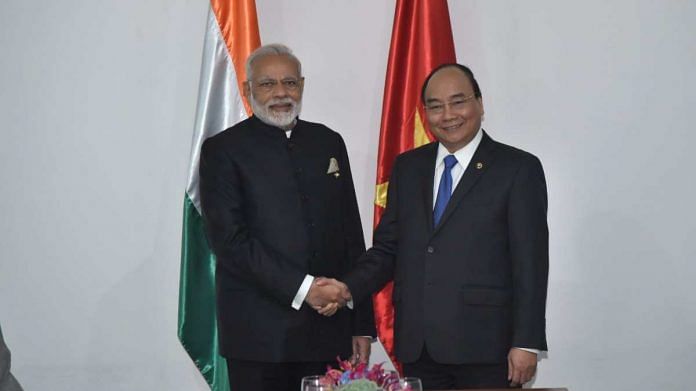
New Delhi: Prime Minister Narendra Modi and his Vietnamese counterpart Nguyen Xuan Phuc Monday discussed mostly issues concerning China’s increasing assertion in the region, and vowed to further strengthen their defence and security cooperation.
Under the gambit of larger geopolitical developments in the region, both the sides, which share a ‘Comprehensive Strategic Partnership’, put significant emphasis on how they view the Indo-Pacific strategy in the backdrop of the New Delhi’s participation in several other aspects of the initiative, particularly the Quad, or the Quadrilateral Security Dialogue.
“Vietnam is a key partner in the Indo-Pacific initiative. Peace, stability and prosperity in the Indo-Pacific region is our common aim. Our cooperation can make an important contribution in maintaining peace and stability in the region,” Prime Minister Narendra Modi said in his opening remarks during a virtual summit.
He also said India now sees its bilateral ties with Vietnam from the prism of strategic growth. Ties between the two countries were upgraded to a comprehensive strategic partnership in 2016 and defence cooperation has been one of its main pillars.
Referring to Prime Minister Modi as his “dearest friend”, the Vietnamese PM said his country looks forward to having a robust defence relationship with India.
Vietnam’s defence minister and the industry minister along with other officials of the cabinet also attended the summit.
According to a joint statement, the two PMs agreed to step up their military-to-military exchanges, training and capacity building programmes across the three services and coast guards. They also agreed to intensify their defence industry collaboration building on India’s defence credit lines extended to Vietnam.
“The summit provided an opportunity to handover one High Speed Guard Boat to Vietnam, launch of two other vessels manufactured in India, and keel-laying seven vessels being manufactured in Vietnam, under the $100 million Defence Line of Credit extended by Government of India for High Speed Guard Boats Manufacturing Project with Vietnam,” said Riva Ganguly Das, secretary (East), Ministry of External Affairs (MEA), during a press conference.
Talks on South China Sea
Both sides also discussed their future plans in defence cooperation by way of institutionalising defence exchanges through mutual logistics support, regular ship visits, joint exercises, exchanges in military science and technology, information sharing, and cooperation in UN peacekeeping.
According to Das, the PM stressed that the Code of Conduct of negotiations on the South China Sea should not prejudice the interest of other countries in the region.
Keeping an eye on China, which has claimed territorial control in the South China Sea that has angered several Southeast Asian countries like Vietnam, both leaders spoke of promoting a rules-based order in the region, including by upholding international law, especially the UNCLOS (United Nations Convention for the Law of the Sea).
Nine agreements signed
Both sides also decided to enhance their energy partnership by way of greater investment in the South China Sea region, which is rich in hydrocarbons.
While India’s ONGC Videsh, the public sector firm’s overseas arm, has sought a two-year extension for exploring the Vietnamese oil block in the contentious South China Sea, Essar is also expected to ramp up its investment there.
Das said both the prime ministers also discussed more investments by ONGC Videsh and Vietnamese energy companies in diverse energy resources.
Both countries also reiterated the need for establishing “reliable, efficient and resilient” supply chains to overcome the adverse impact of the pandemic.
India and Vietnam signed nine agreements Monday, which included a key defence pact between the defence ministries of both the countries.
Subscribe to our channels on YouTube & Telegram
Why news media is in crisis & How you can fix it
India needs free, fair, non-hyphenated and questioning journalism even more as it faces multiple crises.
But the news media is in a crisis of its own. There have been brutal layoffs and pay-cuts. The best of journalism is shrinking, yielding to crude prime-time spectacle.
ThePrint has the finest young reporters, columnists and editors working for it. Sustaining journalism of this quality needs smart and thinking people like you to pay for it. Whether you live in India or overseas, you can do it here.